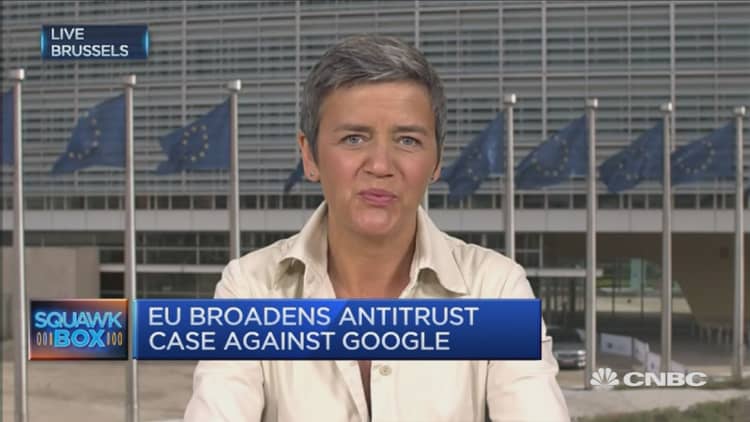
Alphabet's Google could face a raft of separate antitrust cases from the European Union after the search giant has been accused of abusing its dominant position in areas from Android to advertising, the bloc's competition chief told CNBC on Tuesday.
Last week, the European Commission, the EU's executive arm brought a third antitrust charge against Google.
So far, the EU has accused Google of the following:
- Restricting third-party websites from displaying search advertisements from Google's competitors through its "AdSense for Search" platform. Google places ads on third party websites such as online retailers, through AdSense. The Commission says that Google is signing deals that require third parties not to source ads from Google's competitors, reserve the most prominent space on customers' websites for Google ads, and requiring third parties to obtain Google's approval before making any change to display of competing ads.
- Favoring its own comparison shopping service in its general search result.
- Abusing the dominance of its Android mobile operating system by requiring manufacturers of devices to pre-install Google's services such as the Chrome internet browser and Maps, preventing manufacturers from selling mobile devices running on competing operating systems, and offering financial incentives to manufacturers to exclusively pre-install Google search.
So far the Commission has sent so-called "statements of objection" to Google but has not yet charged the company. If Google is found guilty, it could face fines of up to 10 percent of its global turnover per case.
And Margrethe Vestager, the EU commissioner for competition said that the separate charges are unlikely to be combined into one case, so Google could face numerous challenges.
"I think it's hard to say if this will end with one case or the second or the third, because what we see is a quite common pattern between them, quite different Google cases, that they seem to pursue a strategy of remaining dominant in search," Vestager told CNBC in a TV interview.
"So the cases may be different but the main sort of pattern or aim seems to be the same…but I think it is important also for us to start closing cases not only opening cases with Google…because what we want is … a change in behavior, we want an open market, we want other companies to compete with Google, we want other companies to be able to present their products to us as potential customers."
The latest statement of objection around AdSense and Google's shopping results, was the Commissions move to strengthen its case to produce "the strongest possible case when it comes to proving what we find is wrongdoing", Vestager added.
Google has 10 weeks to respond to the AdSense allegations and eight weeks to reply to the shopping comparison objection.
At the time the accusations were levelled, a Google spokesperson said: "We believe that our innovations and product improvements have increased choice for European consumers and promote competition. We'll examine the commission's renewed cases and provide a detailed response in the coming weeks."


